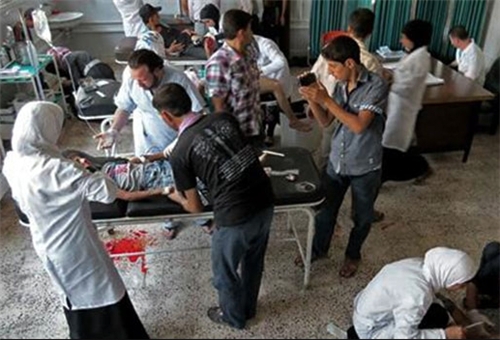 BEIRUT (AP) � International inspectors began destroying Syria's stockpile of chemical weapons and the machinery used to create it, a United Nations official said Sunday, racing under a tight deadline aiming to eliminate President Bashar Assad's chemical weapons program within nine months.
BEIRUT (AP) � International inspectors began destroying Syria's stockpile of chemical weapons and the machinery used to create it, a United Nations official said Sunday, racing under a tight deadline aiming to eliminate President Bashar Assad's chemical weapons program within nine months.The move kicks off the ambitious program, prompted by a chemical weapons attack in mid-August that killed hundreds of civilians on the outskirts of Damascus and brought a rare consensus at the U.N. Under a Security Council resolution in September, the first stage is to destroy Syria's capability to produce chemical weapons by Nov. 1.
He said that by the end of Sunday, a combination of both weapons and some production equipment would be put out of order.
"Today is the first day of the phase of destruction and disabling. Verification will also continue," said the U.N. official, who works alongside inspectors. He spoke on condition of anonymity because of the matters sensitivity. "The plan was that two types categories of materials would be destroyed: one is equipment for making (weapons) � filling and mixing equipment, some of it mobile, and some it static. The other is actual munitions," he said.
He could not confirm what specifically was destroyed, nor where the destruction took place.
"That is the plan � to do it today," he said.
An advance team of disarmament experts from the Organization for the Prohibition of Chemical Weapons arrived in Syria earlier this month to set up the broader operation to dismantle and ultimately destroy the chemical program, believed to include some 1,000 tons of toxic agents. The U.N. Security Council resolution set the tightest timetable ever for the OPCW, to completely eliminate the program by mid-2014.
Their mission stems from a deadly Aug. 21 attack on opposition-held suburbs of Damascus in which the U.N. has determined the nerve agent sarin was used. Hundreds of people, including children were killed. The U.S. and Western allies accuse the Syrian government of being responsible. Damascus blames the rebels.
The Obama administration threatened to launch punitive missile strikes against Syria, prompting frantic diplomatic efforts to forestall an attack. Those efforts concluded with September's unanimous U.N. Security Council resolution endorsing the elimination of Syria's chemical weapons.
The inspection team's mission is further complicated because they have to operate even as Assad's military is battling rebels in the country's bloody civil war.
The conflict, which is rooted in what began as largely peaceful protests in March 2011, has laid waste to the countries' cities, shattered its economy and driven more than 2 million people to seek shelter abroad. The violence affects every corner of Syria, which has become a patchwork of rebel-held and regime-held territory.
In an interview in a state-run newspaper Sunday, Assad said the Syrian regime began producing chemical weapons in the 1980s to "fill the technical gap in the traditional weapons between Syria and Israel." He said production of chemical weapons was halted in the late 1990s, but provided no further information.
By The Associated Press
The Iran Project is not responsible for the content of quoted articles.










